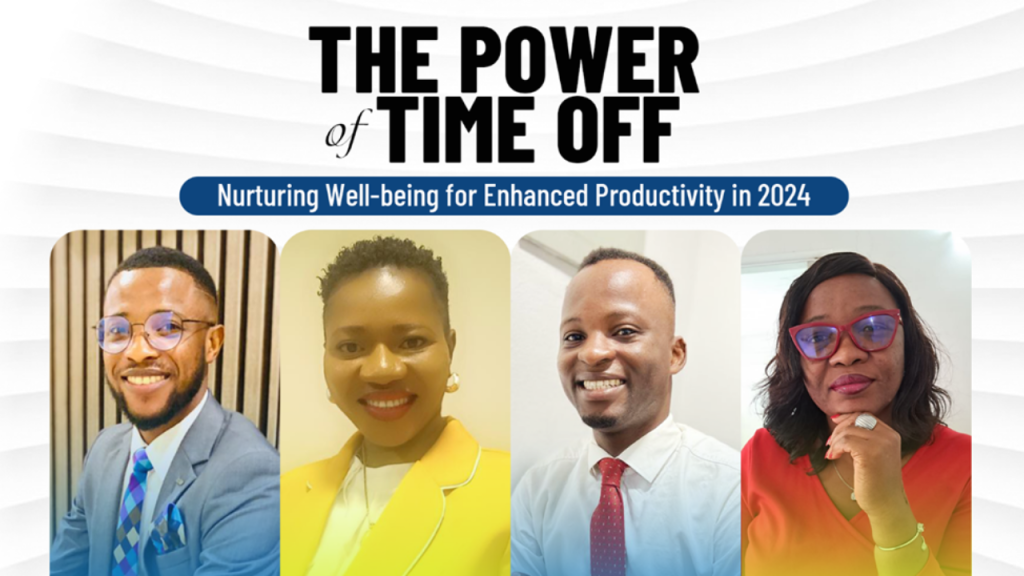16 January 2024
Nurturing Well-being for Enhanced Employee Productivity with Time Off in 2024

What exactly do you think about the impact of time off on employee productivity? An Ernst & Young study showed that for every additional 10 hours of vacation time that employees took, their year-end performance improved by 8%, and another study showed that using all of your vacation time increases your chances of getting a promotion or a raise.
The question of whether employees can take time off when needed is not just a matter of policy but a crucial aspect of fostering a healthy, productive work environment. Moses Agwah, HR Analyst at Proten International, emphasizes the importance of employee empowerment, while Omobolajoko Sowemimo, HR Manager at Trino Studios Limited, advocates for a flexible time-off policy. Keno Oniekoro, Lead HR at FirstWatt Renewables Limited, highlights the multifaceted advantages of employees taking time off. Also to provide her insight from the hospitality industry is Oluwatoyin Adekunte-Akapo, Group Human Resources Manager at Nordic Hotels Nigeria.
Insights:
Adekunte-Akapo’s perspective resonates with a harmony of understanding and compassion. She acknowledges that companies must recognize the diverse reasons employees seek time off; it could be for personal matters, health concerns, vacations, or pursuits of passion and purpose. Her emphasis on company policies as a guiding force aligns seamlessly with Moses Agwah’s call for appropriate communication within policy boundaries.
She underscores the significance of well-defined company policies to guide the process of requesting and approving time off. She acknowledges the delicate balance between supporting employee well-being and ensuring the smooth operation of the business. “Our policies outline the process for requesting and approving time off, putting the operations into consideration,” she states.
Moses’ insight on the importance of communication dovetails with Adekunte-Akapo’s emphasis on structured processes. He notes, “While it’s important to remain considerate of the organization’s workload and needs, don’t hesitate to request either paid or unpaid time off.” The emphasis on communication as a bridge between employees and employers is a common thread in their perspectives.
Omobolajoko proposes a flexible time-off policy, and Adekunte-Akapo’s acknowledgment of diverse reasons for time off complements this idea. Together, they advocate for a workplace culture that not only recognizes but also accommodates the unique needs and aspirations of its workforce.
Keno’s insights on the tangible benefits of time off align with Adekunte-Akapo’s focus on well-being. Both perspectives underscore the long-term advantages of recognizing and supporting employees in their quest for healthy work-life integration.
Making it Interesting:
A day off to recharge from the bustling world of hospitality may sound like a rare luxury, but Adekunte-Akapo reveals that Nordic Hotels Nigeria recognizes it as a necessity. “In a service-oriented industry like ours, the well-being of our employees directly impacts the quality of service we provide,” she notes. Imagine a chef returning from a week-long culinary exploration or a concierge taking a short break to explore new customer service trends. It’s not just a day off; it’s an investment in delivering excellence.
Also, Moses Agwah urges employees not to hesitate to request time off, and Omobolajoko Sowemimo advocates for flexibility. A workplace ethos emerges—one that values open communication and understands the ebb and flow of personal and professional demands.
Keno Oniekoro’s vision of employees returning from time off refocused and ready to enhance business performance is seamlessly woven into the collective narrative. It’s a story of employees who, when supported in their pursuit of well-being, become invaluable assets to the organizations they serve.
Last Notes…
The insights from these diverse HR professionals paint a holistic picture of a workplace that values its employees not just as contributors to the company’s objectives but as individuals with multifaceted lives. As we navigate the complexities of work and life, the question persists: How can organizations continue to evolve, ensuring that policies and practices reflect the changing needs of the modern workforce?
The balance that exists in this shared perspective is realizing the value of time off for employees’ overall well-being. What are your thoughts on this evolving workplace dynamic? How can companies further refine their approaches to support the well-being of their workforce? Share your thoughts, and let’s keep crafting a healthy, thriving workplace.
Join 2000+ Subscribers
Subscribe to Our newsletter to stay informed

UK: 5, Seacourt road, London. SE2 9UW
NIGERIA: 11a, Mojidi Street, off Toyin Street, Ikeja, Lagos.
GHANA: F393/4 Otwse street, Osu, Accra, Ghana
(+234) 901 278 1155
info@protenintl.com
Our Services
Latest Tweets
Lorem ipsum dolor sit amet, consectetur adipiscing elit. Donec nec metus libero. Aliquam non mauris.
Copyright © 2024 Proten. All Rights Reserved
Terms Of Service
Privacy
Cookies




